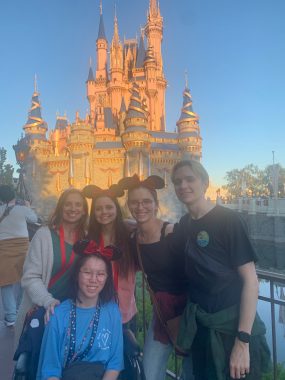I Never Used to Take Photos, but Now I’m Capturing Everything
A message heard loud and clear: 'Change your perspective.'
Written by |

I am not a skilled photographer. Family milestones come and go, and I’ll forget to document them. Christmas will slip by and I won’t take any photos. The same goes for birthdays.
I’d like to think I’m too focused on living in the moment to stop and capture it in a photo. However, it’s probably more likely due to a dash of forgetfulness or maybe even laziness on my part.
There was a time when I deliberately steered clear of taking family pictures. This was when our daughter Grace, then 15, was diagnosed with Lambert-Eaton myasthenic syndrome.
The physical decline we saw Grace experience was staggering. She lost 20 pounds and went from playing basketball to using a wheelchair in just a few months. Her beautiful hair started falling out. There was no denying she was gravely ill.
I don’t completely understand the psychology behind all of my thoughts; I just didn’t want to document what I considered to be the hardest days of our lives.
Changing our perspective
Recently, Grace and I had the opportunity to attend a youth event in Atlanta, Georgia. It had been a goal of mine to get Grace to attend one of these events, which was sponsored by our local church. Grace usually passes on these types of opportunities because of the physical demands they place on her.
In one session, the speaker, Katherine Wolf, approached the stage in a wheelchair. She began her discussion by saying that just under 20% of the world’s population is living with a disability. Yet, she pointed out that only a fraction of them are represented in mass media, such as on television or in movies, as public figures or speakers, etc. Upon hearing that, I immediately saw Grace lean forward to listen attentively.
I had thought that this speaker might be able to offer something to Grace, but what I didn’t know was that she also had a profound message for me.
Wolf had a congenital brain defect that went undetected for years, and it eventually caused a massive stroke when she was just 25.
At that point in the talk, two photos flashed on television screens scattered about the arena. The first was a photo of Wolf at age 25, just a month before her massive stroke. She looked young and vibrant. The second photo showed Wolf with her family on her 40th birthday. She was in a wheelchair.
She noted that most people would look at the photos and feel sad for her. But her perspective is quite different.
Wolf said she doesn’t see loss and despair when she looks at the photos, but rather victory over death, and a husband who is supportive. She sees a second child that was born years after the stroke, defying all of the doctors’ warnings. And she sees a woman who is still living and sharing her family’s story with anyone who will listen!
Documenting our life authentically
Wolf chose to accentuate the positive aspects of her story rather than focus on the loss. She challenged me to do the same. I am now encouraged to document our family’s days through photography.
Because of all of this, I no longer hide from the camera. This is the life we are living, and I’m grateful we get to experience it with Grace.

The Dunham family at Disney World. In front, Grace, and in back from left, Lori, Bethany, Celeste, and Kyle. (Courtesy of Lori Dunham)
Note: Lambert-Eaton News is strictly a news and information website about the disease. It does not provide medical advice, diagnosis, or treatment. This content is not intended to be a substitute for professional medical advice, diagnosis, or treatment. Always seek the advice of your physician or other qualified health provider with any questions you may have regarding a medical condition. Never disregard professional medical advice or delay in seeking it because of something you have read on this website. The opinions expressed in this column are not those of Lambert-Eaton News or its parent company, Bionews, and are intended to spark discussion about issues pertaining to Lambert-Eaton myasthenia syndrome.






Leave a comment
Fill in the required fields to post. Your email address will not be published.